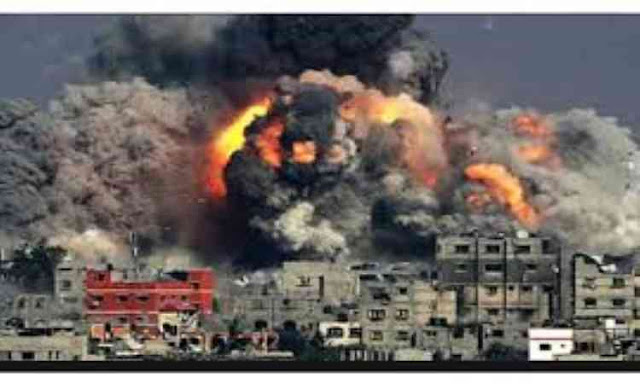Israeli aggression in Palestine: 42 killed in a single day in Israeli airstrikes in Gaza
The controversy stems from the excesses of the police during Ramadan and the controversial activities through the courts
Global New News Desk -
The controversy stems from the excesses of the police during Ramadan and the controversial activities through the courts. The history of the conflict between Israel and Palestine is very old. In a few years there was no major conflict. But occasionally tensions have been created. Later the war situation stopped. But since last week, the tension has suddenly escalated. Air strikes are being carried out in Palestine from time to time. Rockets are also being fired from Gaza. But Guardian and New York Times reporters have tried to find out why the war suddenly broke out. They say last month's raids on the Al-Aqsa Mosque in Jerusalem, the eviction of Palestinians through an Israeli court ruling and attacks on worshipers at the mosque during Ramadan were the main reasons for the conflict.
We have to find the cause of the ongoing conflict in Palestine,
Patrick Kingsley, the New York Times' international affairs correspondent, said the cause of the ongoing conflict in Palestine had to be traced back about a month. On the first night of Ramadan, Israeli forces cut off a loudspeaker inside the Al-Aqsa Mosque. That day was Israel's Memorial Day. The Israeli president was scheduled to address the Western Wall near the mosque. Israeli officials feared the call to prayer could disrupt the Israeli president's speech. So they cut her off. According to the Grand Mufti of Jerusalem, Sheikh Ekrima Sabri, this is the beginning of the week-long conflict. The police raid on Al-Aqsa Mosque added fuel to the fire. "The situation is so bad because of the Israeli police raid on the mosque," he said.
Maybe the incident could have stopped here. However, the situation has worsened in the last few months due to a number of unforeseen incidents. One hundred weeks after the police raid on the Al-Aqsa Mosque, on April 21, hundreds of members of the Jewish extremist group Lehva marched in Jerusalem. At that moment, they attacked Palestinians walking down the street. There is also a picture of an Israeli group attacking a Palestinian house. Many also attacked Palestinian drivers.
The BBC's Jeremy Bowen in the Middle East says
The BBC's Middle East correspondent Jeremy Bowen says the new round of talks has begun with the police crackdown on Ramadan and a controversial move to oust several Palestinian families through the courts.
In the past few weeks, anger has spread among Palestinians over a controversial decision to evict four Palestinian families from the Arab-inhabited area of East Jerusalem, Sheikh Jarrah. They have been virtually evicted. Meanwhile, at the beginning of Ramadan, the situation became even more murky when the police imposed some restrictions on the Palestinians in Jerusalem. This was followed by an attack by Israeli forces on worshipers in al-Aqsa last week.
Not only because of the police raids on the Al-Aqsa Mosque, but also because of the young Palestinians' anger over their national identities. Police also decided to close the Popular Plaza near the Damascus Gate, one of the entrances to Jerusalem. At the time, police spokesman Mickey Rosenfield said the plaza had been closed due to fears of violence. In reality it was disrespectful to the Palestinians. This incident made them angry. Most Palestinians in East Jerusalem are not Israeli citizens of their choice. Israel has occupied Jerusalem since 1967.
Many Palestinians say they have applied for citizenship, but it has not been granted. They can't even vote. Many fear an attempt is being made to force them out of Jerusalem. There are restrictions on building houses. Because of these restrictions, they are forced to leave the city or live illegally.
Abraham Berg, former chairman of the World Zionist Organization and former speaker of the Israeli parliament, said the clashes were the result of years of blockades and sanctions in Gaza, the occupation of the West Bank and discriminatory treatment of Arabs.
42 Palestinians killed in a single day
Meanwhile, Israeli attacks on Gaza in Palestine continue. Sunday was the scariest day. Another 42 Palestinians were killed in Israeli airstrikes on the same day, the highest number in a single day since the start of the offensive in Gaza.
A report on BBC Online on Monday quoted Palestinian officials as saying.
Hamas-controlled health ministry officials said 10 children and 17 women were among those killed in Sunday's Israeli airstrikes. The death toll from the Israeli attack on Gaza has risen to 16. Among them are 55 children and 33 women.
Officials added that at least 1,230 people have been injured in the attack so far. In addition, many homes and buildings were destroyed in Israeli airstrikes.
The Israeli military says Palestinian fighters fired more than 3,000 rockets at Israel last week.
Warning of the situation, UN Secretary-General Antonio Guterres said that if the current situation continues, it could create an "unbridled crisis" for the region.




Comments
Post a Comment